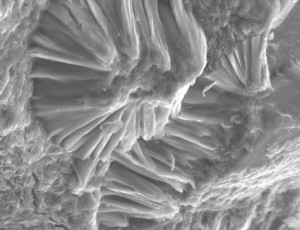While many planetary geologists think Mars would have been warm, wet ideal environment for primitive life, not every agrees. And they have some science of their own to back it up:
Space.com— Along riverbeds, near glaciers, and near oceans, clays on Earth tend to appear near sources of water. Layers of rock gradually weather away, their chemicals transported and mixing to form clay. The process takes time, and so the presence of clays on Mars would seem to indicate relatively long-standing bodies of water, such as oceans, lakes, and streams.
But four years ago, Meunier, working with a group of geologists, found that clays at the Moruroa Atoll in French Polynesia formed quickly with cooling magma rather than slowly with cold ocean water. As the magma cooled, small voids inside of the solidifying lava behaved as tiny pressure-cookers, forming the last generation of minerals, including clays. The iron-rich clays found at this Pacific Ocean atoll are similar in composition to some Martian mineral mixes.
The only samples on Earth that originated on the Martian surface come from rocks blown from the Red Planet long ago that traveled through space to our world. One such sample is the Lafayette Meteorite, a rock of unknown origin that was found in the archives of Purdue University and not identified as of Martian origin until 1931. Studying the meteorite with an eye toward the formation processes at Moruroa, Meunier’s team, which included several geologists from the French-Polynesian group, found a number of similarities.


Damn you, science!
what about the gypsum?
http://www.nasa.gov/home/hqnews/2011/dec/HQ_11-403_Mars_Rover_Gypsum.html
Got to mention recent research that seems to suggest that the so-called ‘Goldilocks zone’…is in fact not quite as crucial as was first thought…
http://www.bbc.co.uk/news/science-environment-19545186
Well, that’s unfortunate, but it doesn’t outright kill the idea that a wet Mars may have once had life… it just shows that certain things can form differently than we thought, which in my opinion (yes, yes, I know…) reduces the already slim chance of life on Mars from low to… low.
Curiosity landed in an area where there might be clays. I wonder if she’ll find a type of clay which is not the type in the meteorites?